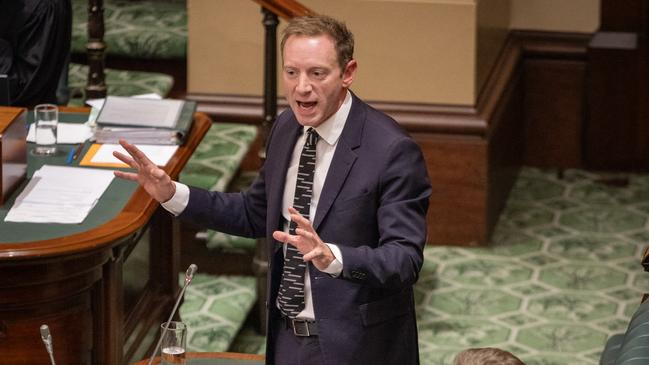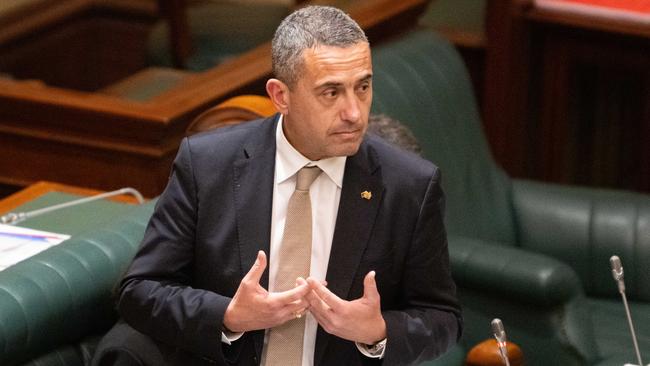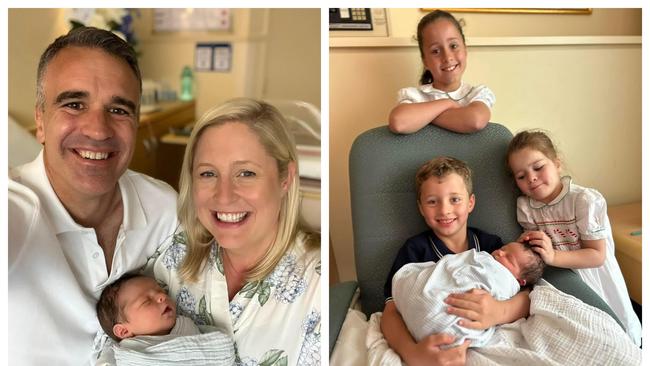Premier Peter Malinauskas’s paternity leave exposes Labor frontbench
Peter Malinauskas’s paternity leave – the first baby for a sitting premier for 78 years – left Labor falling back into old habits, Paul Starick writes.
Opinion
Don't miss out on the headlines from Opinion. Followed categories will be added to My News.
Labor’s excessive reliance on Premier Peter Malinauskas to buoy its support, image and strategy was starkly exposed during his paternity leave absence.
Without the guiding hand of the Premier’s savvy intellect and everyman persona, some of his frontbenchers in parliament variously resembled lost sheep or ravenous wolves.
Veteran minister Tom Koutsantonis played to the public stereotype of him as a bovver boy, unleashing a hit job on former premier Steven Marshall.
Deputy Premier Susan Close, filling in for the Premier on Tuesday and Wednesday, was a competent parliamentary performer but fell short of a commanding presence.
By parliament’s final sitting day for the year on Thursday, Opposition Leader David Speirs had some ammunition for the best speech of his short career at the helm, in which he argued: “The state is run by a bunch of charlatans and angry, arrogant, chortling individuals who mock their roles, who mock their communities, who take South Australians for granted, and who sneer with their elite, inner-city latte-sipping inappropriate conduct at every possible opportunity.”

Former minister Leon Bignell, perhaps unwittingly, did his best to prove Mr Speirs’ point by shouting angrily at the Liberal leader throughout major parts of his five-minute speech.
Given the state Liberal Party has had more than enough insipid, spineless MPs for the past 20 years, Mr Speirs’ charge usually could be dismissed as whining about the necessary verbal combat of an adversarial democracy.
But a taste of life without Mali did not go well for the government. His influence has, generally, removed the excessive aggression, rudeness and overt arrogance routinely displayed by key members of Mike Rann’s government, in particular.
Mr Malinauskas, a keen sports fan, understands the rule of playing hard, but fair, on the field and displaying courtesy and geniality off the field.
But the man he dubbed Labor’s lion, Mr Koutsantonis, in particular, overreached on Wednesday by accusing Mr Marshall of misleading parliament, over a relatively trivial matter, and asking the Speaker to investigate whether a formal privileges committee should be established. The former premier’s sin, Mr Koutsantonis argued, was to incorrectly state that SA does not have a trade office in the European Union when, in fact, one opened in Germany earlier this year.

This was, of course, a silly blunder by a former premier. But raising the serious prospect of a privileges committee, when Mr Marshall swiftly corrected the record anyway, should be viewed as a political attack rather than a legitimately important issue.
Mr Koutsantonis, a Labor warrior, has form. He spearheaded conflict of interest attacks in 2021 on the then-deputy premier Vickie Chapman over her approval of a Kangaroo Island development. A stacked parliamentary committee’s findings resulted in a historic vote of no confidence in Ms Chapman that November, and her standing down as deputy premier and attorney-general. But a top-level investigation by Ombudsman Wayne Lines in May, 2022, cleared Ms Chapman of any conflict of interest – either actual, potential or perceived.
It seemed no coincidence that on Thursday it emerged Mr Marshall had taken a paid role with an American defence research organisation, attracting annual remuneration said to be small. With more justification this time, Mr Koutsantonis quickly declared: “Steven Marshall has left many unanswered questions here.”

In the absence of Mr Malinauskas – the first Premier to add to his family in office since Sir Tom Playford in 1945 – Labor’s front bench looked a little lost. Apart from a few substantial ministers, the front bench is somewhat thin.
Mr Malinauskas hauled Labor to victory in 2022, appealing to small business and other traditional Liberal constituencies. He remains Labor’s strongest asset.
His absence gave an indication of life without the leader. Hard Labor re-emerged, giving the Liberals some hope for the future.
More Coverage
Read related topics:Peter Malinauskas





